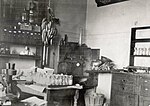Columbia University School of Social Work
1898 establishments in New York CityColumbia UniversityEducational institutions established in 1898Pages with login required references or sourcesSchools of social work in the United States
The Columbia University School of Social Work is the graduate school of social work of Columbia University. It is the nation's oldest social work program, with roots extending back to 1898, when the New York Charity Organization Society's first summer course was announced in The New York Times and began awarding the Master of Science (MS) degree in 1940. With an enrollment of over 900, it is one of the largest social work schools in the United States. The combination of its age and size has led to the School becoming a repository for much of the reference literature in the social work field.
Excerpt from the Wikipedia article Columbia University School of Social Work (License: CC BY-SA 3.0, Authors).Columbia University School of Social Work
West 121st Street, New York Manhattan
Geographical coordinates (GPS) Address External links Nearby Places Show on map
Geographical coordinates (GPS)
| Latitude | Longitude |
|---|---|
| N 40.810252777778 ° | E -73.958352777778 ° |
Address
School of Social Work
West 121st Street 417
10027 New York, Manhattan
New York, United States
Open on Google Maps




